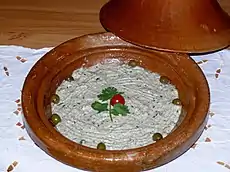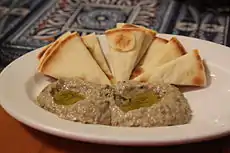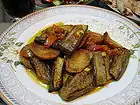Baba ghanoush
Baba ghanoush (UK: /ˌbɑːbə ɡæˈnuːʃ/, US: /- ɡəˈnuːʃ, - ɡəˈnuːʒ/;[3][4][5] Arabic: بابا غنوج, romanized: bābā ġannūj), also spelled baba ganoush or baba ghanouj,[3][4][5][1] is a Levantine appetizer consisting of finely chopped roasted eggplant, olive oil, lemon juice, various seasonings, and tahini.[5][1][6] The eggplant is traditionally baked or broiled over an open flame before peeling, so that the pulp is soft and has a smoky taste.[7] It is a typical meze ('starter') of the regional cuisine, often served as a side to a main meal and as a dip for pita bread.[1]
 | |
| Course | Appetizer |
|---|---|
| Place of origin | Lebanon[1] |
| Associated national cuisine | Iraq, Armenia,[2] Syria, Lebanon, Palestine, Jordan, Israel, Egypt, Libya, and Turkey |
| Main ingredients | Eggplant, olive oil |
 Moutabbal (or M'tabbal) and pita bread | |
| Course | Appetizer |
|---|---|
| Place of origin | Levant |
| Main ingredients | Eggplant, olive oil |
A very similar dish is mutabbal (Arabic: متبل lit. 'spiced'). Mutabbal is sometimes said to be a spicier version of baba ghanoush. Mutabbal consists of mashed roasted eggplants, tahini, salt, pepper, garlic, lemon and often yogurt.[8]
Etymology
The bābā is an Arabic word that means 'father' and is also a term of endearment, while ġannūj could be a personal name.[4] The word combination is also interpreted as "father of coquetry" or "indulged/pampered/flirtatious daddy" or "spoiled old daddy".[3][1][9] It is not certain whether the word bābā refers to the eggplant, or to an actual person indulged by the dish.[1]
Varieties
Eastern Arabian cuisine versions of the dish vary slightly from those of the Levant by spicing it with coriander and cumin;[9] those versions might be minimally spiced and topped with thinly chopped parsley or coriander leaves.[10]
In Turkey, the dish is known as babaganuş or abugannuş. While the ingredients vary from region to region, the essentials (eggplants, tahini, garlic, lemon) are generally the same.
In Armenia, the dish is known as mutabal. The essential ingredients in Armenian mutabal are eggplant, tahini, garlic, lemon, and onion; and most Armenians also add cumin.
Food writer and historian Gil Marks writes in his book that: "Israelis learned to make baba ghanouj from the Arabs".[1] An Israeli variant, salat ḥatzilim, is made with fried or grilled eggplants mixed with mayonnaise, salt, lemon and chopped fried onions.[11][12] It is usually topped with olive oil when served.
See also
- List of Middle Eastern dishes
- Eggplant salads and appetizers, an overview of similar dishes prepared around the world
- List of dips
- List of eggplant dishes
- List of hors d'oeuvre
- List of Arab salads
References
- Gil Marks (2010). "Baba Ghanouj". Encyclopedia of Jewish Food. Houghton Mifflin Harcourt. ISBN 9780544186316.
- "Baba Ghanoush". 4 November 2011. Retrieved 19 May 2020.
- "baba ghanouj". The American Heritage Dictionary of the English Language (5th ed.). HarperCollins. Retrieved 25 April 2019.
- "baba ghanouj" (US) and "baba ganoush". Lexico UK English Dictionary. Oxford University Press. Archived from the original on 22 March 2020.
- "baba ghanoush". Merriam-Webster Dictionary. Retrieved 25 April 2019.
- Baba ganoush. Oxford English Dictionary (3rd ed.). Oxford University Press. September 2006.
A Middle Eastern (originally Lebanese) dish of puréed roasted aubergine, garlic, and tahini.
- Khayat, Marie Karam; Keatinge, Margaret Clark. Food from the Arab World, Khayats, Beirut, Lebanon.
- "Middle Eastern Mutabbal Recipe". 29 March 2022.
- Salloum, Habeeb (28 February 2012). The Arabian Nights Cookbook: From Lamb Kebabs to Baba Ghanouj, Delicious Homestyle Arabian Cooking. Tuttle Publishing. ISBN 9781462905249.
- "Baba Ganoush: Quintessentially Levantine". Your Middle East. 7 January 2013. Retrieved 29 July 2019.
- Levy, F. Feast from the Mideast (2003) p.41
- Nathan, J. (2011). Joan Nathan's Jewish Holiday Cookbook. Knopf Doubleday Publishing Group. pp. 57–58. ISBN 978-0-307-77785-0. Retrieved 23 December 2016.
Bibliography
- David, Elizabeth (1950). A Book of Mediterranean Food. Alfred A. Knopf. ISBN 0-394-49153-X.
- Levy, F. (2003). Feast from the Mideast. Harper Collins. ISBN 0-06-009361-7.
- Trépanier, Nicolas (30 November 2014). Foodways and Daily Life in Medieval Anatolia: A New Social History. University of Texas Press. ISBN 978-0-292-75929-9.
